CERBE – Turkey’s Secret Plan To Invade Greece & Armenia
A plan for a simultaneous Turkish invasion of both Greece and Armenia was prepared by Turkey, according to the secret documents of the Turkish General Staff.

A plan for a simultaneous Turkish invasion of both Greece and Armenia was prepared by Turkey, according to the secret documents of the Turkish General Staff.

According to these documents, the plan called “CERBE” was prepared in 2014 and updated in 2016.
According to the Nordic Monitor, “Turkey was inspired by the name of its secret war plans for the eastern Mediterranean, from a significant victory Ottoman naval machine against a fleet of Christian alliance that strengthened Turkish rule in the Mediterranean.”
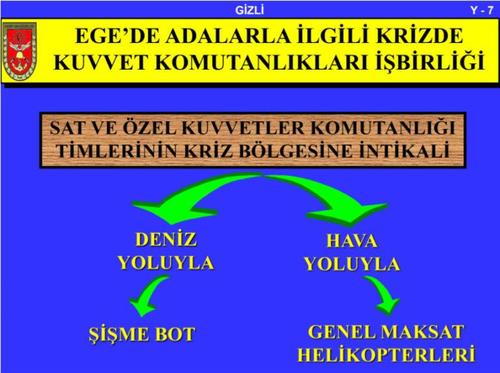
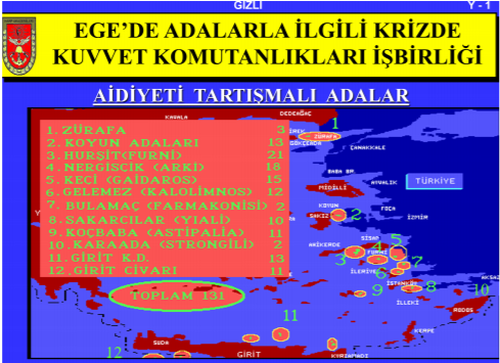
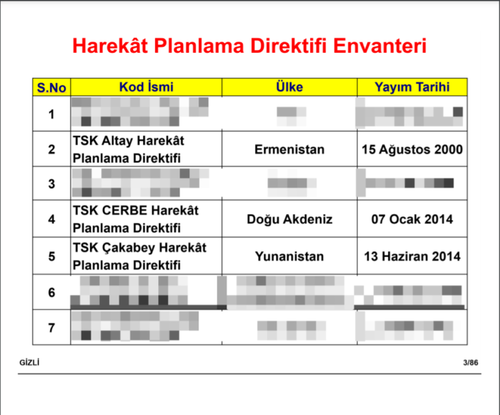
According to a PowerPoint presentation prepared by the General Staff for a review of interior design, Turkey has drawn up a plan for a secret military operation called “TSK [Turkish Armed Forces] Cerbe Operation Planning Directive”. The plan was dated January 7, 2014, which means that it was probably updated amid increased tension between Turkey and Greece / Cyprus in the eastern Mediterranean, the report also states. Cerbe is the name of an island in southern Tunisia near the border with Libya.
It was there that the Battle of Djerba took place in May 1560 between the Ottoman forces and the fleet of the Christian Alliance, which consisted mainly of Spanish, Papal, Genoese, Maltese and Neapolitan forces.
“The Turks won the battle, which gave them dominance in the Mediterranean Sea,” the report said, adding that “the name of Turkey’s comprehensive war game plan in the eastern Mediterranean fits in with the narrative promoted by Turkish President Recep Tayyip Erdogan” and his associates, who often place Turkey’s problems with its Western allies as part of a renewed conflict between Christian Europe and Muslim Turkey. A slide from the powerpoint from the secret document lists the military plans of Turkey against Greece, Armenia and Cyprus in the Eastern Mediterranean with corresponding dates that show when they were drawn up“.
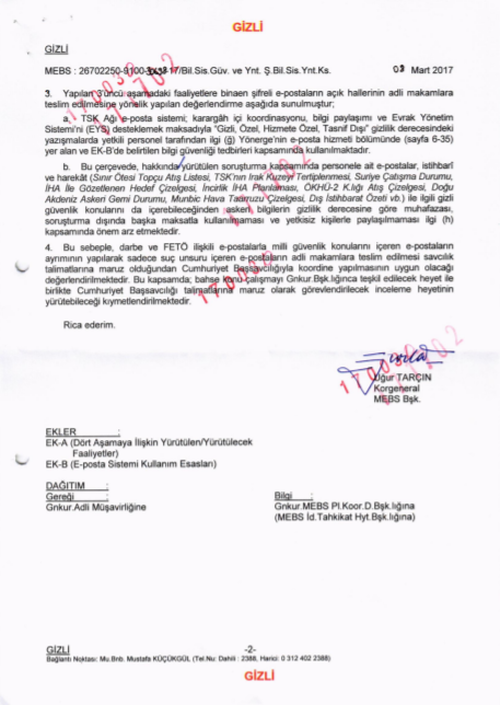
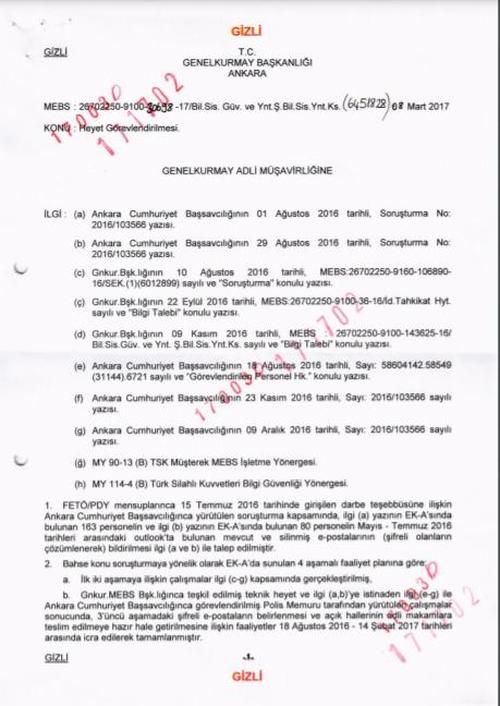
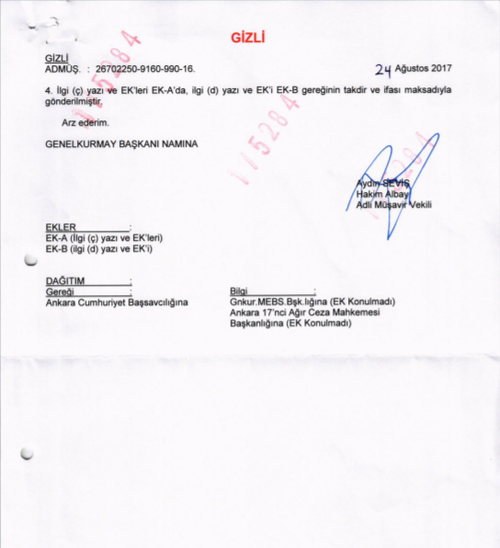
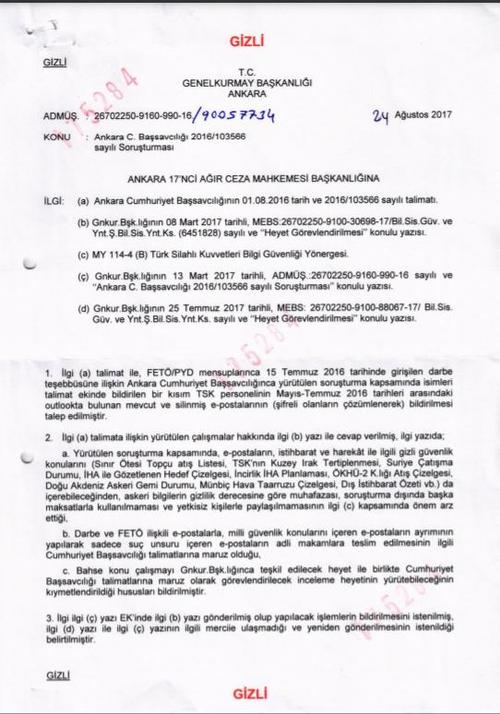
“The existence of Turkey’s war plan for the east was discovered in a court file in the Turkish capital, with prosecutor Serdar Coşkun, loyal to the Turkish president, apparently forgetting to remove the classified documents before submitting them to the court,” the statement said, which continues: “They were collected from the headquarters of the General Staff during an investigation into the failed coup on 15 July 2016. The documents, including the plan to invade Greece and Armenia, were found to have been sent among the top commanders to the General Staff through a secure internal email.
Koskun ordered the army to forward copies of all emails for the previous two months, including the encrypted ones, on August 1, 2016. Ten days later, on August 11, 2016, the prosecutor instructed his trusted assistant, a police officer named Yüksel Var, collect emails from the General Staff’s internal servers and report to him. A panel set up by military technicians under Var completed its work on 14 February 2017. Finally, the indictment filed by prosecutors Necip Cem İşçimen, Kemal Aksakal and İstiklal Akkaya in March 2017 at the 17th Supreme Criminal Court of the All of Ankara the e-mails collected from the computers of the General Staff“.
The Nordic Monitor concludes: “No communication was found in the e-mails indicating any coup attempt, which many believe was a disorientation operation organized by Erdogan and his intelligence and military leaders to trap the opposition to persecution and mass purges.
The document does not contain details about the specifics of the program other than its name and updated date. The details of the war plan must have been labeled “confidential” and therefore could not be communicated through the intranet system running on the Turkish army’s email exchange servers. A review of the documents also shows that the General Staff, which notified the emails at the outset, panicked eight months later about the possible impact of the disclosure of sensitive documents and began sounding the alarm. The first warning letter was written on March 8, 2017 by the Chief of General Staff Unur Tarçın, Head of the Communication, Electronic and Information Services System of the General Staff (Muhabere, Elektronik ve Bilgi Sistemleri, or MEBS).
He warned the General Staff Legal Service that the documents contained secret documents related to Turkey’s national security, classified intelligence reports and operations in Syria and the eastern Mediterranean. He said the documents should be kept secret and not disclosed to unauthorized persons.
The Deputy Chief Legal Adviser of the General Staff, Colonel Aydın Seviş, then wrote to the 17th Ankara High Criminal Court on 24 August 2017, reiterating the same concerns about the secret documents and urging the establishment of a committee to review them. However, the Turkish prosecutors did not seem to pay attention to their concerns and included all the emails with the attached secret documents in the case file, revealing the highly classified information including the name of the invasion plan for Greece”.
Full story: https://www.zerohedge.com/geopolitical/turkeys-secret-plan-invade-greece-and-armenia
DISCLAIMER: The author is solely responsible for the views expressed in this article. The author carries the responsibility for citing and/or licensing of images utilized within the text.
